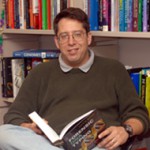I love to read and, over the past thirty-five years, have likely read in excess of two thousand books. In addition, I have had the privilege of writing three books so far (and plan to write several more) that are attempts to define my scientific field of forensic DNA analysis. Continual learning has always been a way of life since I was raised in a home with parents who were both educators. I am grateful to live in the information age when knowledge covers the earth and is now easily available with a few keystrokes. I hope that I can always put the knowledge I gain to good use.
The book I have studied most intently in my life is the Book of Mormon. I first read it as a teenager and have read and re-read its powerful passages dozens of times. As an inquisitive scientist who grew up in the “Show Me” state of Missouri, I have always been one who liked to study and understand the background for every subject I approached. While a full-time missionary in Boston, Massachusetts, I was exposed to attempts to challenge the authenticity of the Book of Mormon and to the use of intellectual arguments to discredit Joseph Smith and the origins of the church he restored. These challenges led me to study the history of Joseph Smith and the Church of Jesus Christ of Latter-day Saints. Thus began an enjoyable lifetime of learning and gospel study.
The Book of Mormon is the foundation of my testimony. A study of its pages reveals details and structure too complex for a twenty-three-year-old farm boy to have created in the spring of 1829. I believe it to be of ancient origin—written by inspired prophets in the ancient Americas for our benefit today. Its message has important applications for us. While imperfect people exist today as they have since the Church was organized in 1830, the organization and its head, our Savior Jesus Christ, are perfect. The primary message of the Book of Mormon is to invite us to come unto Christ and to learn and live His gospel. I have served in a variety of positions within the Church, including five years as a bishop, and know from personal experience that revelation is real and can truly bless people’s lives. God loves His children and speaks to us today on a personal level and through a living prophet.
Scholarship comes from a desire to master information on a particular subject and involves intense study with careful attention to detail. The depths of a topic under investigation are plumbed through diligent research and hard work. Often after a great deal of effort, the final product is usually a scholarly publication or presentation. Having gone through this process many, many times in my professional career on numerous topics, I would suggest that a testimony of the Gospel of Jesus Christ is subject to the same requirements: desire, diligence, and devotion to data collection and analysis, and the due process of time. For those with a desire to learn, the data are available. And most importantly, the Source is citable—“by the power of the Holy Ghost, [you] may know the truth of all things” (Moroni 10:5).
Posted September 2010 on FairMormon.org

John M. Butler holds a B.S. in chemistry from Brigham Young University and a Ph.D. in analytical chemistry from the University of Virginia and is an internationally renowned scientist specializing in forensic applications of DNA. He has written over 100 scientific articles along with three widely used text books, holds two U.S. patents, and is an editor for the top journal in his field. He has been an invited speaker on five continents and serves on a number of DNA advisory committees. Dr. Butler and his wife Terilynne are parents of six children—all of whom have been proven to be theirs through DNA testing. [Note: The opinions expressed here are his own and do not represent the U.S. Department of Commerce, the National Institute of Standards and Technology, or the Church of Jesus Christ of Latter-day Saints.]